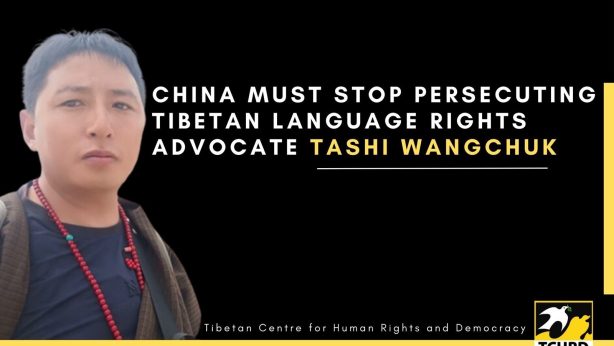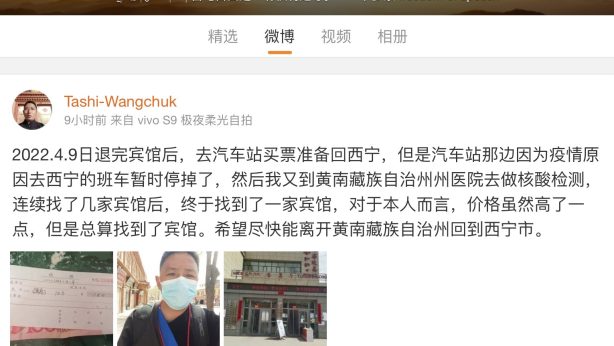Charged of inciting separatism, detained former Tibetan political prisoner Tsegon Gyal on ‘silent protest’

On the eve of Christmas, Chinese authorities charged a prominent former Tibetan political prisoner of ‘inciting to split the country’ (煽动分裂国家罪) after holding him incommunicado for more than two weeks at Kangtsa (Ch: Gangcha) County Detention Centre in Tsojang (Ch: Haibei) ‘Tibetan Autonomous Prefecture’ (TAP) in Qinghai Province, in the Tibetan province of Amdo.
Tsegon Gyal was charged of the crime on 24 December and a copy of his arrest warrant was sent to his family on the same date. Mr Gyal has been in the custody of the Tsojang Prefecture State Security Bureau officers since 9 December, after he was arbitrarily detained on the same date in Dashi (Ch: Ha’êyan) County in Tsojang TAP.
The Tibetan Centre for Human Rights and Democracy (TCHRD) has been informed by a reliable source that Mr Gyal has launched a ‘silent protest’ (以沉默对抗) by refusing to respond to the State Security Bureau officers who have been holding and interrogating him. “Tsegon Gyal knows that the interrogation process is simply a tool for the state security officers to extract forced confession and that no amount of honest response would help him prove his innocence,” a close friend of Mr Gyal told TCHRD. “The investigation was a farce and the charge was imposed on him.”
The charge of ‘inciting to split the country’, if proved, would be punished as a crime of “endangering state security” that could result in a 15-yr sentence. The exact reason for Mr Gyal’s arrest is not known although it is common for Tibetan activists and critics of Chinese government to be subjected to arrest, torture, surveillance and imprisonment on trumped-up charges of endangering state security, which refers a group of specific crimes under Articles 102–113 of the Chinese Criminal Law.
Since his detention, Mr Gyal has not been allowed to meet with his family and relatives, nor has he been provided access to legal representation. With Mr Gyal refusing to speak, it is difficult to understand on what basis the authorities charged him of the crime. By exercising his right to silence, Mr Gyal is also protesting against the denial of his right to hire a lawyer and seek legal protection. But Chinese Criminal Procedure Law contains weak protection against self-incrimination, or the right to be presumed innocent. Article 14 (g) of International Covenant on Civil and Political Rights asserts the right not to be compelled to testify against oneself as well as the right not to confess guilt. This right becomes all the more crucial when a person is detained incommunicado and vulnerable to torture and coercive interrogations.
Background information
Tsegon Gyal, aka Gangshon Atse, was born on 12 August 1963 to a family of nomads in Kangtsa region in the Tibetan province of Amdo. After successfully completing his high school, Mr Gyal worked as a teacher and later joined the county police force as a trace evidence analyst. He was one of the first four Tibetan candidates, in a batch of 30, who successfully passed the professional police course in Qinghai Province. Apart from his career in law enforcement, Mr Gyal also pursued a successful career in journalism working for many years at Qinghai Tibetan News and Qinghai Legal Daily. He received numerous awards for his journalistic works.
Mr Gyal was one of the thousands of Tibetan political prisoners documented by TCHRD since 1991. From 1991 to 2016, TCHRD’s Political Prisoners Database has documented 5001 political prisoners in Tibet. Before his detention earlier this month, Mr Gyal’s name was listed in the ‘released’ political prisoners. His status has now gone back to ‘detained’.
In May 1993, Mr Gyal was detained along with two others, Lukar Jam (aka Lupe) and Namlo Yak Dhungser by the provincial state security officers. They were detained for setting up a group called ‘Association Of Domed Youth Committed To Sacrificing Lives’ in collusion with outsiders to organise Tibetan independence activities in Tibet. On 28 July 1994, Mr Gyal was convicted for espionage and counterrevolutionary crimes and sentenced to 16 years and deprivation of political rights for four years. The sentence was passed by the Intermediate People’s Court of Tsonub (Ch: Haixi) Mongolian Tibetan Autonomous Prefecture. Lukar Jam and Namlo Yak Dhungser were convicted for the same crimes. Mr Jam was sentenced to 17 years and deprivation of political rights for five years while Mr Dhungser was sentenced to 12 years and deprivation of political rights for four years.
The sentencing drew widespread condemnation from the international community and calls for their release gained great momentum at the time, thanks to efforts by the international community and the prevalent political environment in the late 1990s. China at the time was making all the right moves including amending its draconian laws to present a favourable image to the international community in order to achieve the smooth handover of Hong Kong to China. In 1997, some of the most abused provisions in Chinese Criminal Procedure Law (CPL) such as those related to ‘counter-revolutionary’ crimes were replaced with ‘endangering state security’. In the winter of that year, the Qinghai Higher People’s Court reversed the previous conviction and sentenced Mr Gyal to six years and deprivation of political rights for two years for engaging in separatist activities, one of the many offences punishable under the crime of ‘endangering state security’. Mr Dhungser was given four years and one year of deprivation of political rights for the same crime. By then, Mr Jam who was then on medical parole had fled into exile. They are probably the first Tibetans to be convicted for ESS crimes after the 1997 CPL amendment. Mr Dhungser was released on 14 November 1997 and Mr Gyal on 8 May 1999. After release, Mr Dhungser followed Mr Jam into exile. Mr Dhungser now lives in Australia and Mr Jam in India.
Mr Gyal is known for his great love for his country and people. He devoted much of his life towards the welfare of his community and fellow Tibetans. For instance, soon after his release Mr Gyal organised disability awareness and rehabilitation campaigns at Kangtsa town, encouraging and inspiring the disabled persons and giving them hope for a brighter future. The campaign later gave birth to a full-fledged musical troupe that performed all over the province as well as in Chinese cities. At the instigation of local secret service agents, local authorities soon took control of the musical troupe forcing Mr Gyal to leave. Also in 2015 when pilgrims from all over Tibet visited the Tsongonpo (Qinghai) Lake to pay their respects to a spot made sacred by the visit of the Fifth Dalai Lama, Mr Gyal arranged for the free provision of food and drinks (one of the beverages was named ‘Dalai Drinks’) for all pilgrims and contributed to the revival of an age-old Tibetan religious tradition and the custom of providing mutual help and cooperation.
In 1993, when Mr Gyal was arrested along with Mr Jam and Mr Dhungser, authorities in Qinghai Province set up a task force to carry out a criminal investigation into the case. The head of the task force was Tang Zhengren, who was then Director of Provincial Public Security Bureau, Political Commissar of Provincial Armed Police Forces, and Secretary of Provincial Political and Legal Committee. Tang was no different from many other high-level Chinese officials who are wont to overstate any big or small issues before the higher authorities to get extra funds and seek promotion. Tang lost no time in referring the matter regarding Mr Gyal and his two friends to the Ministry of Public Security in Beijing, which in turn granted a sum of one million yuan for investigation purposes (The current value should be around 10 million yuan). Several years later, in an official crackdown on corruption, one of the officials, who was a member of the investigation team, committed suicide after he was exposed of corruption. And in 1997, Tang lost his position. But Tang was not investigated for abusing his power and authority in mishandling Mr Gyal’s case and misusing government funds. China’s domestic security spending has since risen up to unprecedented levels exceeding the country’s military budget. In 2013, China announced that its internal security budget had increased to 769.1 billion yuan ($130 billion); the third year in a row it outstripped defense spending.
One of the greatest concerns of Mr Gyal’s family and friends is that the self-serving local authorities might again use Mr Gyal as a scapegoat in the name of ‘endangering state security’ to get more funding and seek promotion. Mr Dhungser, a former political prisoner and a friend of Mr Gyal, said, “The current Chinese president Xi Jinping has made a great show of the anti-corruption campaign, vowing to crack down on both ‘flies’ and ‘tigers’. If a real investigation was launched to ascertain the actual amount used by local authorities to lock up thousands of Tibetans on vague and trumped up criminal charges, one would not only net the so-called flies and tigers but also foxes, dogs and wolves.” Another concern, according to Mr Dhungser, is that Mr Gyal has a history of sitting on hunger strike in prison. “We fear that he might do the same this time and thereby jeopardise his fragile health.”
Mr Gyal’s arbitrary and incommunicado detention has deeply shocked and pained his family and relatives especially his aging parents. Mr Gyal’s relatives and friends fear that Mr Gyal’s father Tselo, 83, and mother Tsewang Kyi, 79, may not survive the shock for long. In such an eventuality, all relevant officials of the State Security Bureau of Tsojang Prefecture and Qinghai Province must be held responsible.
Further, TCHRD urges the Chinese authorities to:
- Immediately make public the reasons for Mr Gyal’s detention and grant access to his family members and a lawyer of his choice
- Guarantee in all circumstances the physical and psychological integrity of Mr Gyal
- Guarantee that Mr Gyal is examined by independent doctors and receive adequate medical care if necessary;
- Immediately release Mr Gyal without any precondition and cease holding him without charge


